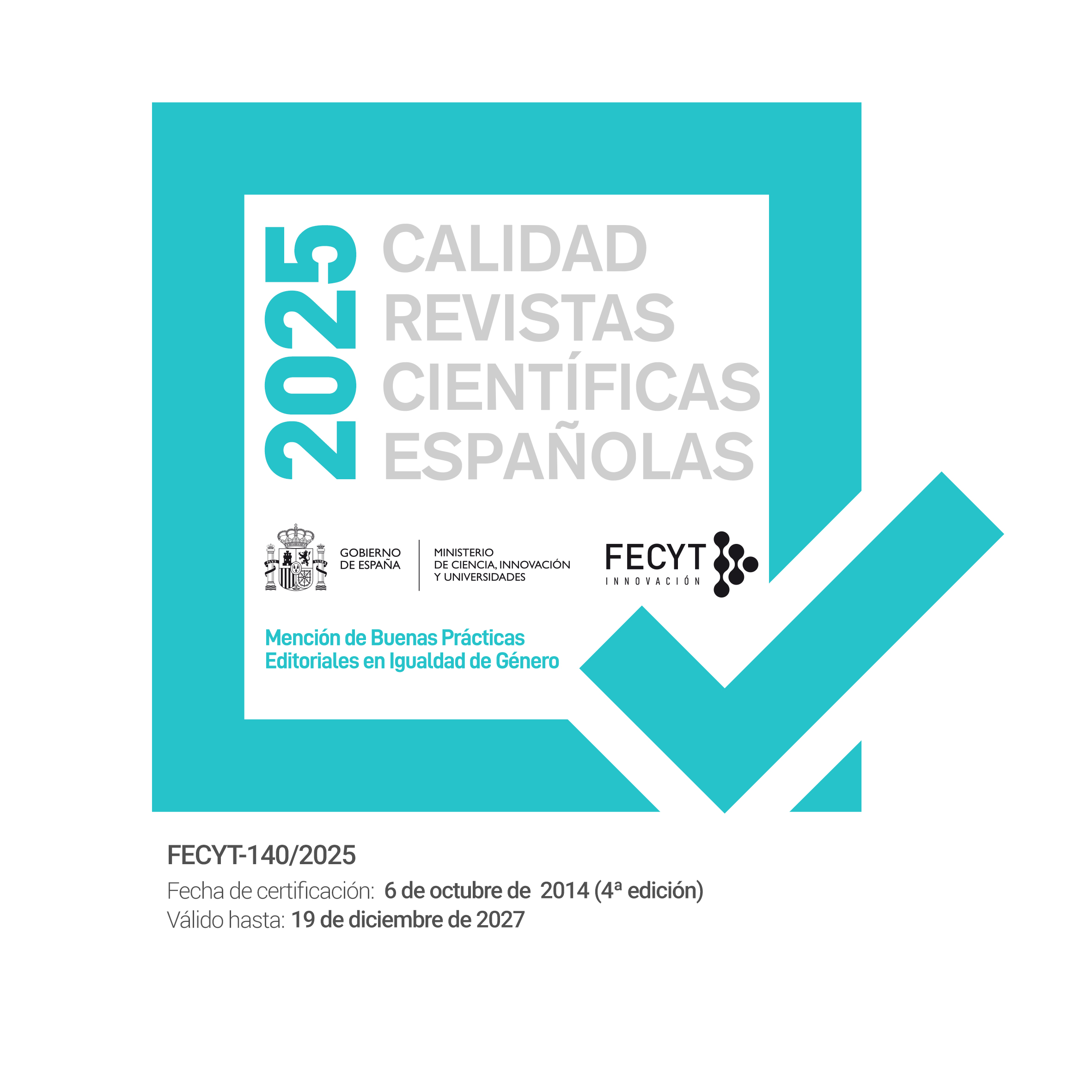INFLUENCIA DE VARIABLES COGNITIVAS Y MOTIVACIONALES EN EL RENDIMIENTO ACADÉMICO EN MATEMÁTICAS EN ESTUDIANTES CHILENOS
DOI:
https://doi.org/10.5944/educxx1.19052Palabras clave:
Motivación, enseñanza de las matemáticas, razonamiento inductivo, razonamiento formal, matemáticas, ecuaciones estructurales.Resumen
Además de los procesos cognitivos y niveles de abstracción propios de su naturaleza disciplinar, la motivación o predisposición hacia las matemáticas interactúa de forma relevante con el rendimiento académico en ella. Este estudio busca cuantificar el efecto que puede tener la incorporación de la variable predisposición hacia las matemáticas dentro de un modelo complejo que, además, considera las habilidades cognitivas como el razonamiento lógico formal y de los niveles de inteligencia lógica de tipo inductivo que posea el estudiante sobre el rendimiento académico en matemáticas, y evaluar hasta qué punto el éxito en dicha asignatura retroalimenta e influye en el logro académico general. Para esto, se utilizaron diferentes instrumentos para medir la predisposición, como el Test of Logical Thinking (TOLT), el Test de Inteligencia Lógica Superior (TILS) y una escala de tipo Likert para medir la predisposición hacia las matemáticas. La interacción de las variables se modeló mediante ecuaciones estructurales, desde donde se pudo apreciar el importante rol que desempeña esta predisposición hacia las matemáticas en el rendimiento de esta disciplina, y cómo además dicha predisposición interactúa y modula la incidencia de los factores cognitivos sobre el rendimiento académico general, atenuando la fuerza de sus relaciones univariantes. Se discute el rol educativo de estos hallazgos, como también las posibles vías para mejorar una predisposición negativa hacia las tareas matemáticas en el dominio escolar.Descargas
Citas
Acevedo, J. A. y Oliva, J. M. (1995). Validación y aplicaciones de un test de razonamiento lógico, Revista de Psicología General y Aplicada, 48, 339-352.
Aguilar, M., Navarro, J., López, J. y Alcalde, C. (2002). Pensamiento formal y resolución de problemas matemáticos. Psicothema, 14(2), 382-386.
Akin, A. & Kurbanoglu, I. (2011). The relationships between math anxiety, math attitudes, and self-efficacy: A structural equation model. Studia Psychologica, 53(3), 263-274.
Barkl, S., Porter, A. & Ginns, P. (2012). Cognitive training for children: effects on inductive reasoning, deductive reasoning, and mathematics achievement in an Australian school setting. Psychology in the Schools, 49(9), 828-842. doi: 10.1002/pits.21638.
Cerda, G. (2012). Logical intelligence levels and math performance: a study on primary and secondary Chilean students. Universidad de Córdoba, Córdoba. Retrieved from http://hdl.handle.net/10396/8061
Cerda, G., Ortega, R., Pérez, C., Flores, C. y Melipillán, R. (2011). Inteligencia lógica y extracción social en estudiantes talentosos y normales de Enseñanza Básica y Media en Chile. Anales de Psicología, 27(2), 389-398.
Cerda, G., Ortega-Ruiz, R., Casas, J., Del Rey, R., y Pérez, C. (2016). Predisposición desfavorable hacia el aprendizaje de las Matemáticas: una propuesta para su medición. Estudios Pedagógicos., 42 (1), 53-63.
Cerda, G., Pérez, C., Navarro, J. I., Aguilar, M., Casas, J., Aragón, E. (2015). Explanatory Model of Emotional-Cognitive Variables in School Mathematics Performance: A Longitudinal Study in Primary School. Frontiers in Psychology, 6, article 1363, 1-10. DOI:10.3389/fpsyg.2015.01363.
Cerda, G., Pérez, C. y Melipillán, R. (2010). Test de Inteligencia Lógica Superior (TILS). Manual de Aplicación. Concepción: Universidad de Concepción.
Cleary, T. & Chen, P. (2009). Selfregulation, motivation, and math achievement in middle school: Variations across grade level and math context. Journal of School Psychology, 47, 291-314. doi: 10.1016/j.jsp.2009.04.002.
Del Rey, R. Madera, E. & Ortega-Ruiz, R. (2011). Validation of CAT-Ma: an instrument of measure of the emotional impact of mathematics learning. Proceedings of the 14th Biennial conference of the European association for Research on learning and instruction. Exeter/ United Kingdom.
Desco, M., Navas-Sánchez, F., Sánchez-González, J., Reig, S., Robles, O., Franco, C., Guzmán-De-Villoria, Gracía-Barreano, P. & Arango, C. (2011). Mathematically gifted adolescents use more extensive and more bilateral areas of the frontoparietal network than controls during executive functioning and fluid reasoning tasks. NeuroImage, 57, 281-292. doi: 10.1016/j.neuroimage. 2001.03.063.
Devine, A., Fawcett, K., Scuzs, D. & Dowker, A. (2012). Gender differences in mathematics anxiety and the relation to mathematics performance while controlling test anxiety. Behavioral and Brain Functions, 8(33). doi: 10.1186/1744-9081-8-33
Flora, D. B. & Curran, P. J. (2004). An Empirical Evaluation of Alternative Methods of Estimation for Confirmatory Factor Analysis With Ordinal Data. Psychological Methods, 9(4), 466-491. doi:10.1037/1082-989X.9.4.466.
Ganley, C. M., & Vasilyeva, M. (2011). Sex differences in the relation between math performance, spatial skills and attitudes. Journal of Applied Developmental Psychology 32, 235-242. doi: 10.1016/j.appdev.2011.04.001.
Guven, B. & Cabakcor, B. (2013). Factors influencing mathematical problem-solving achievement of seventh grade Turkish students. Learning and Individual Differences, 23, 131-137.
Hailikari, T., Nevgi, A. & Komulainen, E. (2008). Academic self-beliefs and prior knowledge as predictors of student achievement in Mathematics: A structural model. Educational Psychology, 28(1), 59-71.
Hirvonen, R., Tolvanen, A., Aunola, K., & Numi, J-E. (2012). The developmental dynamics of task-avoidant behavior and math performance in kindergarten and elementary school. Learning and Individual Differences, 22, 715-723. doi:10.1016/j.lindif.2012.05.014.
Hu, L. & Bentler, P. M. (1999). Cutoff criteria for fit indexes in covariance structure analysis: Conventional criteria versus new alternatives. Structural Equation Modeling: A Multidisciplinary Journal, 6(1), 1-55. doi:10.1080/10705519909540118.
Jansen, B., Louwerse, J., Straatemeier, M., Van der Ven, S., Klinkenberg, S. & Van der Maas, H. (2013). The influence of experiencing success in math on math anxiety, perceived math competence, and math performance. Learning and Individual Differences, 24, 190-197. doi: 10.1016/j.lindif.2012.12.014.
Jiménez, C., Murga, M. A., Gil, J. A., Téllez, J. A. y Trillo, M. P. (2010). Hacia un modelo sociocultural explicativo del alto rendimiento y la alta capacidad: Ámbito académico y capacidades personales. Educación XX1, 13(1), 125-153.
Jones, M., Gardner, G., Taylor, A. Wiebe, E., & Forrester, J. (2011). Conceptualizing magnification and scale: The roles of spatial visualization and logical thinking. Research in Science Education, 41(3), 357-368. doi: 10.1007/s11165-010-9169-2.
Jöreskog, K. G. (1994). On the estimation of polychoric correlations and their asymptotic covariance matrix. Psychometrika, 59(3), 381-389. doi:10.1007/BF02296131.
Kikas, E., Peets, K., Palu, A. & Afanasjev, J. (2014) The role of individual and contextual factors in the development of maths skills. Educational Psychology: An International Journal of Experimental Educational Psychology, 29(5), 541-560. doi: 10.1080/01443410903118499.
Klauer, K. & Phye, G. (2008). Inductive reasoning: A training approach. Review of Educational Research, 78(1), 85-123.
Lee, J. & Stankov, L. (2013). Higherorder structure of noncognitive constructs and prediction of PISA 2003 mathematics achievement. Learning and Individual Differences, 26, 119-130. doi: 10.1016/j.lindif.2013.05.004.
Lee, S. Y. & Chapman, E. (2013). Development of a short form of the attitudes toward mathematics inventory. Educational Studies in Mathematics, 82, 145-164.
Marchisa, L. (2011). Factors that influence secondary school students’ attitude to Mathematics. Social and Behavioral Sciences, 29, 786-793. doi:10.1016/j.sbspro.2011.11.306.
Maris, S. & Difabio, H. (2009). Logro académico y pensamiento formal en estudiantes de ingeniería. Electronic Journal of Research in Educational Psychology, 7(2), 653-672.
Martín, E., Martínez-Arias, R., Marchesi, A. & Pérez, E. (2008). Variables that predict academic achievement in the Spanish compulsory Secondary Educational System: A longitudinal multilevel analysis. The Spanish Journal of Psychology, 11(2), 400-413.
Miñano, P. y Castejón, J. L. (2011). Variables cognitivas y motivacionales en el rendimiento académico en Lengua y Matemáticas: un modelo estructural. Revista de Psicodidáctica, 16(2), 203-230.
Moenikia, M. & Zahed-Babelan, A. (2010). A study of simple and multiple relations between mathematics attitude, academic motivation and intelligence quotient with mathematics achievement. Social and Behavioral Sciences, 2, 1537-1542. doi:10.1016/j.sbspro.2010.03.231.
Molera, J. (2012). ¿Existe relación en la Educación Primaria entre los factores afectivos en las Matemáticas y el rendimiento académico? Estudios sobre Educación, 23, 141-155.
Morony, S., Kleitman, S., Ping Lee, Y. & Stankov, L. (2013). Predicting achievement: Confidence vs self-efficacy, anxiety, and self-concept in Confucian and European countries. International Journal of Educational Research 58, 79-96. doi: 10.1016/j.ijer.2012.11.002.
Nasiriyan, A. Azar, H. K. Noruzy, A. & Dalvand, M. R. (2011). A model of selfefficacy, task value, achievement goals, effort and mathematics achievement. International Journal of Academic Research, 3(2), 612-618.
Navarro, J., Aguilar, M., Marchena, E., Ruiz, G. y Ramiro, P. (2011). Desarrollo operatorio y conocimiento aritmético: vigencia de la teoría piagetiana. Revista de Psicodidáctica, 16(2), 251-266. doi: 10.1387/RevPsicodidact.970.
Nosek, B. A. & Smyth, F. L. (2011). Implicit social cognitions predict sex differences in math engagement and achievement. American Educational Research Journal, 48, 1124-1154. doi: 10.3102/0002831211410683.
Nuñez, T., Bryant, P., Evans, D., Bell, D., Gardner, S., Gardner, A. & Carraher, J. (2007). The contribution of logical reasoning to the learning of mathematics in primary school. British Journal of Developmental Psychology, 25, 147-166. DOI:10.1348/026151006X153127.
Núñez-Peña, M., Suárez-Pellicioni, M. & Bono, R. (2013). Effects of math anxiety on student success in higher education. International Journal of Educational Research 58, 36-43. doi: 10.1016/j.ijer.2012.12.004.
Orrantia, J., Tarín, J. y Vicente, S. (2011). El uso de la información situacional en la resolución de problemas aritméticos. Infancia y Aprendizaje, 34(1), 81-94.
Parker, P., Marsh, H., Ciarrochia, J., Marshall, S. & Abduljabbarc, A. (2014). Juxtaposing math self-efficacy and self-concept as predictors of longterm achievement outcomes. Educational Psychology. 34(1), 29-48. doi: 10.1080/01443410.2013.797339.
Rosario, P., Laurenço, A., Paiva, O., Rodrigues, A., Valle, A. y Tuero-Herrero, E. (2012). Predicción del rendimiento en matemáticas: efecto de variables personales, socioeducativas y del contexto escolar. Psicothema, 24(2), 289-295.
Roselli, M., Ardila, A., Matute, E. & Inozemtseva, O. (2009). Differences and cognitive correlates of mathematical skills in school-aged children. Child Neuropsychology, 15(3), 216-231. doi:10.1080/09297040802195205.
Samuelsson, J. & Granström, K. (2007). Important prerequisites for students’ mathematical achievement. Journal of Theory and Practice in Education, 3, 150-170.
Satorra, A. & Bentler, P. M. (2001). A scaled difference chi-square test statistic for moment structure analysis. Psychometrika, 66(4), 507-514. doi:10.1007/BF02296192.
Schweinle, A., Meyer, D. & Turner, J. (2006). Striking the right balance: Student’s motivation and affect in upper elementary mathematics classes. Journal of Educational Research, 99(5), 271-293.
Selkirk, L., Bouchey, H. & Eccles, J. (2011). Interactions among domainspecific expectancies, values, and gender: Predictors of test anxiety during early adolescence. Journal of Early Adolescence, 31(3), 361-389. doi: 10.1177/0272431610363156.
Shim, S., Ryan, A. & Anderson, C. (2008). Achievement goals and Achievement during early adolescence: Examining time-varying predictor and outcome variables in growth-curve analysis. Journal of Educational Psychology, 100(3), 655-671. doi: 10.1037/0022-0663.100.3.655.
Suárez-Álvarez, J. Fernández, R. & Muñiz, J. (2013). Self-concept, motivation, expectations, and socioeconomic level as predictors of academic performance in mathematics. Learning and Individual Differences, doi: 10.1016/j.lindif.2013.10.019.
Taub, G., Floyd, R., Keith, T. & McGrew, K. (2008). Effects of general and broad cognitive abilities on mathematics achievement. School Psychology Quarterly, 23(2), 187-198.
Thoman, D., Smith, J., Brown, E., Chase, J. & Lee, J. (2013). Beyond Performance: A Motivational Experiences Model of Stereotype Threat. Educational Psychology Review, 25(2), 211-243. doi: 10.1007/s10648-013-9219-1.
Valle, A., Cabanach, R. G., Núñez, J. C., González-Pienda, J. A., Rodríguez, S. & Piñeiro, I. (2003). Cognitive, motivational and volitional dimensions of learning. Research in Higher Education, 44(5), 557-580.
Vandecandelaere, M., Speybroeck, S., Vanlaar, G., De Fraine, G. & Van Damme, J. (2012). Learning environment and students’ mathematics attitude. Studies in Educational Evaluation, 38, 107-120. doi: 10.1016/j.stueduc.2012.09.001.
Yaratan, H. & Kasapoğlu, L. (2012). Eighth grade students’ attitude, anxiety, and achievement pertaining to mathematics lessons. Social and Behavioral Sciences 46, 162-171. doi: 10.1016/j.sbspro.2012.05.087.
Zan, R., Brown, L., Evans, J. & Hannula, M. (2006). Affect in mathematics education: An introduction. Educational Studies in Mathematics, 63, 113-121. doi: 10.1007/s10649-006-9028-2.
Descargas
Publicado
Cómo citar
Número
Sección
Licencia
Derechos de autor 2017 Educación XX1

Esta obra está bajo una licencia internacional Creative Commons Atribución-NoComercial 4.0.
La revista Educación XX1 se publica bajo licencia Creative Commons Reconocimiento-NoComerciaL 4.0 (CC BY-NC 4.0). Se permite la generación de obras derivadas siempre que no se haga un uso comercial. Tampoco se puede utilizar la obra original con finalidades comerciales.










